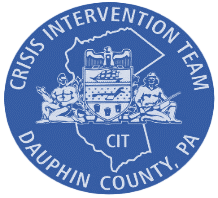Dauphin County Crisis Intervention Team

Who We Are
About Us
In working within the Stepping Up Initiative here in Dauphin County, Crisis Intervention Team (CIT) Training was developed to upskill law enforcement officers on how to support individuals of all ages with their mental health needs. We conduct trainings to support law enforcement, probation, and correctional officers as well as community support agencies to learn skills on de-escalation and interaction with those who have a mental illness, co-occurring disorder, intellectual/developmental disability, and/or in crisis. Coupled with the CIT Program is the Co-Responder Program which embeds mental health specialists with CIT Officers to improve responses to mental health related calls.
Total Number of CIT Personnel Trained: | 406 |
Police Officers (All Dauphin County Police Departments) | 230 |
State Troopers | 76 |
Sherriff’s Department | 5 |
Probation Officers/Work Release Officers | 12 |
Dauphin County Prison (Correctional Officers, Diversion Specialists, Treatment) | 45 |
Other (DA’s Office Behavioral Health Unit, Human Services Staff, Community Staff) | 38 |
PRIMARY CONTACTS:
Certified CIT Coordinator / Certified CIT De-Escalation Train-The-Trainer / Lead Co-Responder

Certified CIT Coordinator / Certified CIT De-Escalation Train-The-Trainer / District Attorney’s Office Consultant

ADDITIONAL CONTACTS:
Certified CIT Coordinator / Deputy Chief Co-Responder
Contact Information:
· Phone: 717-780-6767, ext. 62710
· Email: dchianos@dauphincounty.gov
Certified CIT Coordinator / Behavioral Health Court Program Manager
Contact Information:
· Phone: 717-780-6756
· Email: hburd@dauphincounty.gov
About Our Program
Mission Statement
The mission of the Dauphin County Crisis Intervention (CIT) Team is to promote public safety while diverting individuals with serious mental illness and/or co-occurring disorders from the criminal justice system while keeping these individuals safe and accountable as they engage in necessary treatment. The CIT Team will support the individual with the process of recovery and will result in an increase in safety and security for the residents of Dauphin County through lower rates of incarceration or unnecessary inpatient treatment stays.
How We Got Started
Dauphin County Officials recognized the need to support those with mental health issues in the legal system. Without proper services, individuals with mental health cycle through the criminal justice system with higher recidivism rates. This part of the Stepping Up Initiative was conceived and implemented to be able to support those individuals within the mental health community earlier in the criminal justice system.
This project was funded by the Pennsylvania Commission on Crime and Delinquency (PCCD) through a Justice Assistance Grant Under $10K Initiative #30997, “CIT Training for Dauphin County Law Enforcement”. This Crisis Intervention Team (CIT) training does not reflect the views of PCCD or any federal, state, or local government agency. The CIT training is part of a larger Dauphin County Stepping-Up Initiative recommendation to improve criminal justice system responses when encountering individuals with a severe mental health diagnosis or co-occurring disorder.
Program Overview
This innovative approach is to divert individuals with mental illness and/or co-occurring disorders from the criminal justice system. The Crisis Intervention Team (CIT) training program provides an integrated approach for individuals living with a mental illness, intellectual disability, Autism, and/or co-occurring disorder and encountering law enforcement without rising to the level of jail custody.
Law Enforcement Officers along with other first responders can attend a 40-hour training which provides them with verbal de-escalation skills as well as cover the following topics:
- Mental Health Overview (including identification and medications)
- Substance Use and Co-Occurring Disorders
- In Our Own Voice (individuals with lived experience come in to speak with officers)
- Hearing Voices (trainees learn firsthand what it can be like for the individual they are speaking with)
- Autism
- Intellectual/Developmental Disabilities
- Veterans and PTSD
- Problem Solving Courts
- Suicide Prevention, QPR & Self-Care
- Homelessness
- Site Visits (Trainees are able to attend agencies where an individual may go for treatment services.)
- Older Adults
- Youth & Trauma Informed Approaches
- Cultural Awareness
- Crisis Intervention and Rights & Civil Commitment
- Legal Aspects
- Community Resource Fair (Providers from various agencies provide resources and speak with trainees.)
Tools obtained from the training can support the officer/first responder with working towards the best possible outcome for the person. Below is a video from NAMI to show an overview of how CIT can support both Police Officers and the Community.
(NAMI, 2011)

